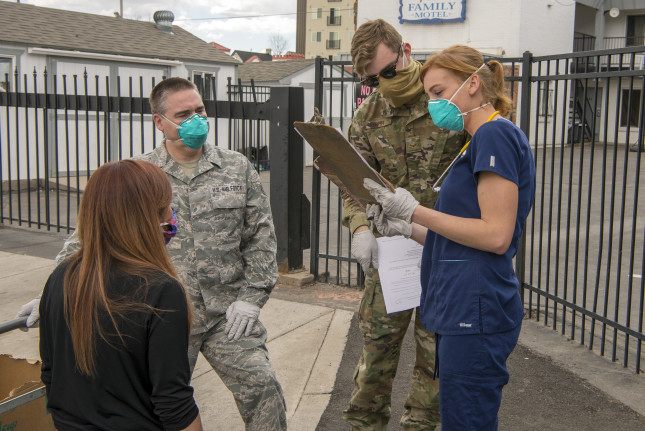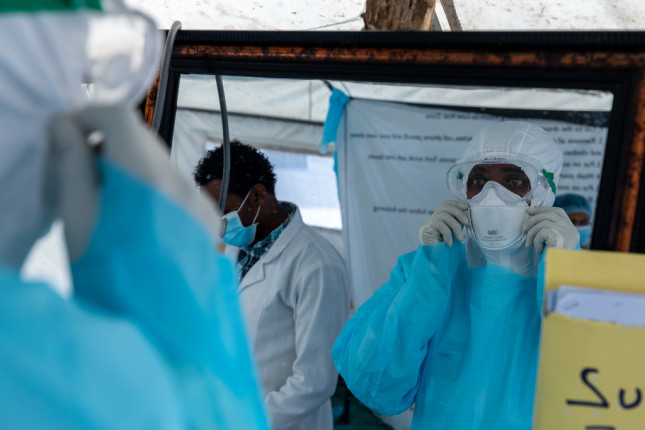-
Preventing the Next Pandemic: Zoonotic Diseases and Future Outbreaks
› To recover from the devastating impacts of COVID-19, we will need to understand the risks and environmental factors that caused the novel coronavirus and other zoonotic diseases to emerge in the first place, according to a new report by the United Nations Environment Programme and the International Livestock Research Institute. The report, Preventing the Next Pandemic – Zoonotic Diseases and How to Break the Chain of Transmission, examines the root causes of the COVID-19 pandemic and other zoonotic diseases. It also explores the complex linkages between biological and non-living factors that impact our global ecosystem and spread diseases.
To recover from the devastating impacts of COVID-19, we will need to understand the risks and environmental factors that caused the novel coronavirus and other zoonotic diseases to emerge in the first place, according to a new report by the United Nations Environment Programme and the International Livestock Research Institute. The report, Preventing the Next Pandemic – Zoonotic Diseases and How to Break the Chain of Transmission, examines the root causes of the COVID-19 pandemic and other zoonotic diseases. It also explores the complex linkages between biological and non-living factors that impact our global ecosystem and spread diseases. -
Population Age Structure: The Hidden Factor in COVID-19 Mortality
›
Until several months ago, demographers regarded a youthful age structure as an unequivocally detrimental demographic characteristic. Where more than half of the population is younger than age 25, countries are unable to attain high levels of economic and human capital development and face an increased risk of some forms of civil conflict. Yet, so far, during the ongoing pre-vaccine stage of the COVID-19 pandemic, the most age-structurally mature countries have been hardest hit by the disease. These countries are generally urbanized, wealthy, well-educated, and include a large proportion of seniors. And, somewhat surprisingly—despite being equipped with advanced medical technologies—these countries are experiencing the highest rates of mortality from complications related to COVID-19.
-
Urbanization in the Age of Pandemic
›
Late last year, what is thought to be a bat-associated coronavirus infected humans in Wuhan, a city of 11 million in China, possibly after a stopover in illegally traded pangolins—setting off a global pandemic. This kind of thing has happened before—with AIDS, SARS, and MERS, for example. Much remains unknown about the biology of COVID-19, which is alarmingly communicable by people with few or no symptoms. But an epidemic is only part biology. It is also driven by cultural factors, and urbanization is a crucial aspect. As sites of large gatherings and dense living conditions, cities offer the perfect settings for the spread of infection, yet their role seems to have often gone unremarked in discussions of the pandemic.
-
Water for the Most Vulnerable Could Help Stop Spread of Covid-19
›
Development specialists are sounding the alarm. The pandemic will not be stopped unless we provide safe water to the world’s most vulnerable people, according to UN experts. Soap and clean water are part of the arsenal of weapons we can deploy on the frontlines of the battle to halt the virus’ spread. Yet Covid-19 continues to pose an unprecedented threat to more than 2 billion of the world’s poorest people who lack the access to safe water, sanitation, and health services (WASH) needed to protect them during infectious disease outbreaks, according to the World Health Organization.
-
Unpacking Covid-19 and the Connections Between Ecosystems, Human Health, and Security
› “What are the underlying drivers of risk that created the conditions for Covid-19 to emerge, and how do we better address them?” said Lauren Herzer Risi, Project Director for the Environmental Change and Security Program, in this week’s Friday Podcast, recorded during a recent Wilson Center Ground Truth Briefing on the Covid-19 pandemic. This question framed the discussion, which explored the intersection of the environment, public health, and national security. Although the global pandemic came as a shock to many, the novel coronavirus was not a surprise to epidemiologists and experts who had been sounding the alarm for decades. There have been clear signals of the risks we face from animal-to-human virus transmission, including Ebola, SARS, and other regional epidemics, said Risi. These zoonotic diseases, especially now, are creating concerns about food safety, wildlife conservation, and public health. But the risks don’t just come from wet markets and our increasingly connected world.
“What are the underlying drivers of risk that created the conditions for Covid-19 to emerge, and how do we better address them?” said Lauren Herzer Risi, Project Director for the Environmental Change and Security Program, in this week’s Friday Podcast, recorded during a recent Wilson Center Ground Truth Briefing on the Covid-19 pandemic. This question framed the discussion, which explored the intersection of the environment, public health, and national security. Although the global pandemic came as a shock to many, the novel coronavirus was not a surprise to epidemiologists and experts who had been sounding the alarm for decades. There have been clear signals of the risks we face from animal-to-human virus transmission, including Ebola, SARS, and other regional epidemics, said Risi. These zoonotic diseases, especially now, are creating concerns about food safety, wildlife conservation, and public health. But the risks don’t just come from wet markets and our increasingly connected world. -
We Must Address Exotic Wildlife Consumption to Avoid the Next Global Pandemic
›
A suspect in the transmission of Covid-19 to humans, pangolins are the most trafficked animal in the world despite the ban on trade by the Convention on International Trade in Endangered Species of Wild Flora and Fauna (CITES). Currently on the Red List of the International Union for Conservation of Nature (IUCN), pangolins are armadillo-looking mammals found in Asia and Africa but are more closely related to cats and dogs. Humans hunt them for their scales used in traditional medicine and the fashion industry and for their meat, which is considered a delicacy. Asian pangolins have become critically endangered, and poachers have turned to trafficking African species, most destined for China and Vietnam. According to TRAFFIC, a leading non-governmental organization working on wildlife trade, twenty tons of pangolins are trafficked each year, putting them on the fast track to extinction.
-
Gender and the “War” on Covid-19
›
The rhetoric of war is all around us during the Covid-19 pandemic, from the World Health Organization to historical takes. More critical assessments note that this war, like others, will hurt the most vulnerable. In a recent essay, feminist political scientist Cynthia Enloe takes issue with this rhetoric, pointing to the historic ways in which wars have led to “racist, homophobic, and anti-Semitic practices.” Whether or not war rhetoric is helpful at this crucial moment, the current pandemic should be a wake-up call to expand what investments we consider essential to our national security, how we value work, and who gets called a hero.
-
The Covid-19 Crisis in Africa
›
“African countries are facing a severe health crisis. As of this morning, there are 14,573 confirmed cases of Covid-19 and 790 deaths in 52 out of 54 countries,” said Judd Devermont, director the Center for Strategic and International Studies’ Africa Program, at an April 13th event on the impacts of Covid-19 in Africa. The World Health Organization has estimated a 5 percent drop in Africa’s GDP and the United Nations Economic Commission for Africa (UNECA) believes that as many as 20 million jobs will be lost. There is also a political dimension to this crisis, as governments struggle to deliver services, provide safety and security, and allow people to continue livelihoods, said Judd.
Showing posts from category infectious diseases.



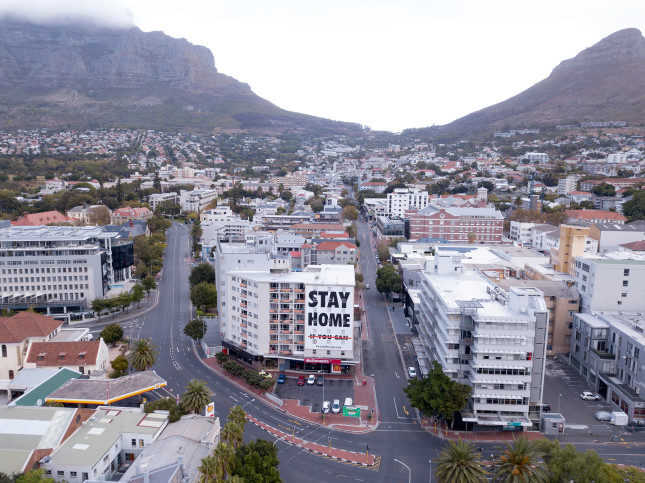
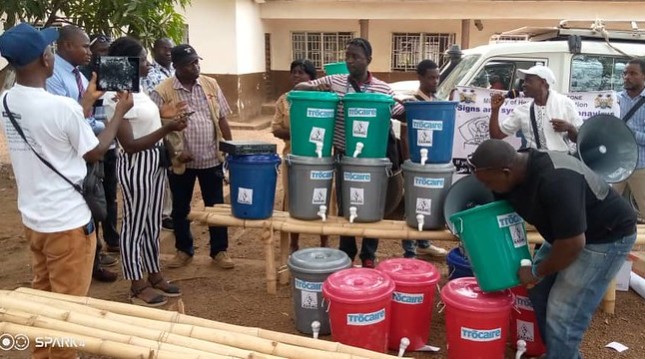
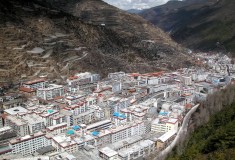 “What are the underlying drivers of risk that created the conditions for Covid-19 to emerge, and how do we better address them?” said Lauren Herzer Risi, Project Director for the Environmental Change and Security Program, in this week’s Friday Podcast, recorded during a recent Wilson Center
“What are the underlying drivers of risk that created the conditions for Covid-19 to emerge, and how do we better address them?” said Lauren Herzer Risi, Project Director for the Environmental Change and Security Program, in this week’s Friday Podcast, recorded during a recent Wilson Center 
